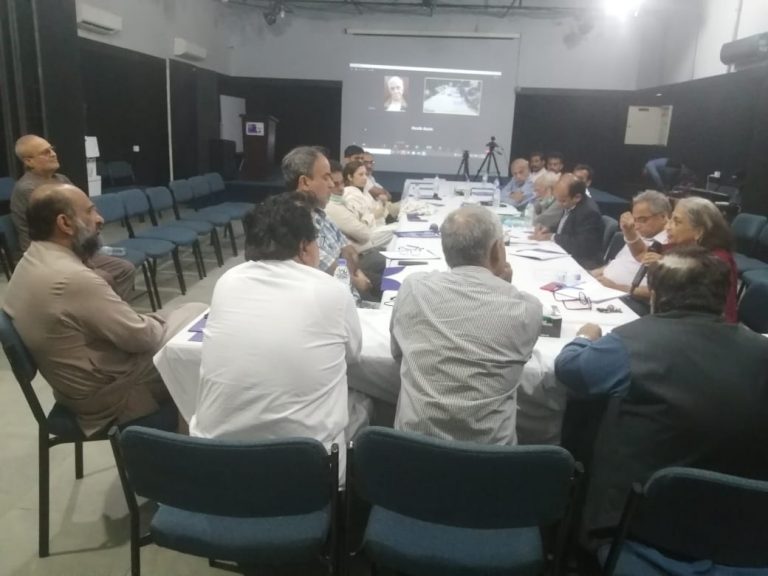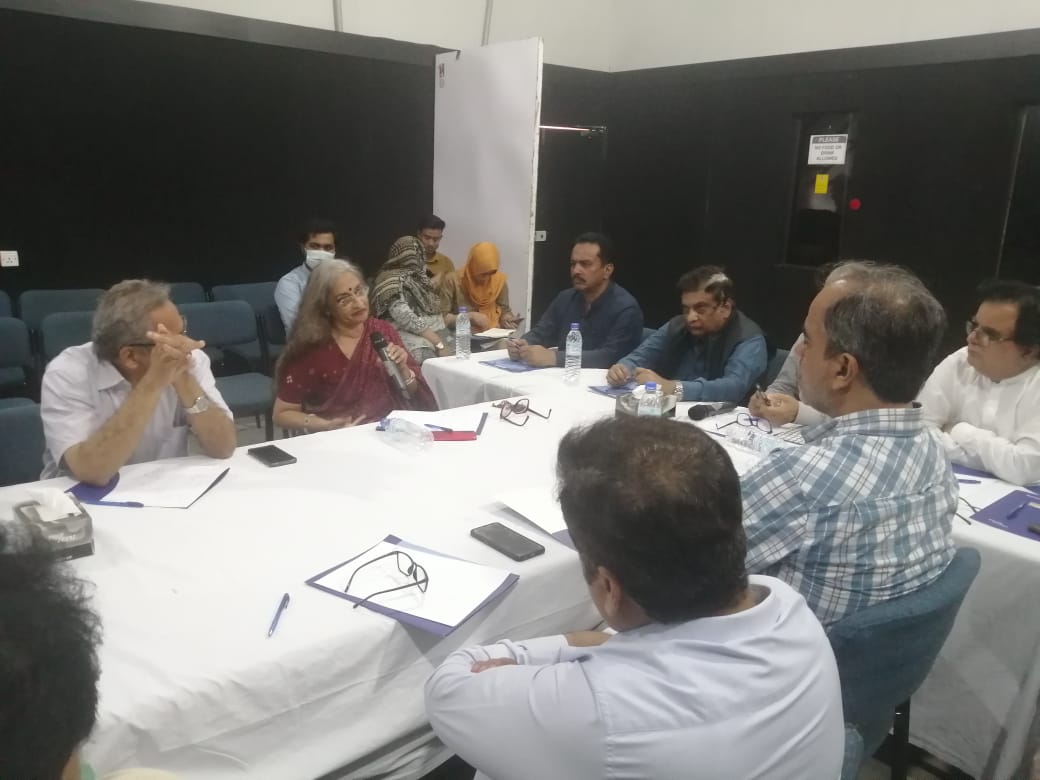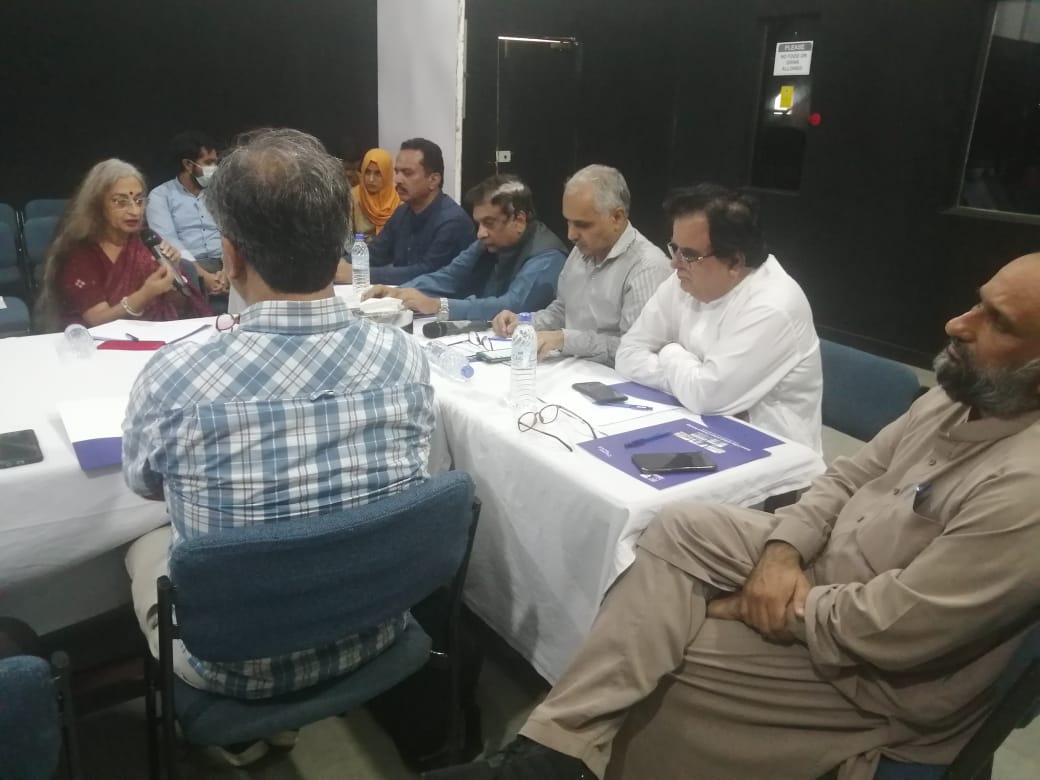
There is dire need of legislation and its strict enforcement in the country to ensure equal rights and status to the marginalized, underprivileged and oppressed communities across the country.
The participants of roundtable discussion held at SZABIST decide to initiate advocacy drive and move a Bill in the parliament through Senator Krishna Kumari Kolhi.
Sindh Courier Report
Karachi
Members of civil society, representing various organizations, Tuesday felt the dire need of legislation and its strict enforcement in the country to ensure equal rights and status to the marginalized, underprivileged and oppressed communities across the country.
“Despite national and international conventions, these marginalized groups are deprived to perform at their potential and are isolated at different segments of society including social and political level even after seven and half a decade of creation of Pakistan,” they said taking part in Roundtable Discussion held at Shaheed Zulfiqar Ali Bhutto Institute of Science & Technology (SZABIST), Karachi.
The aim of the discussion titled ‘Making Pakistan an Inclusive Society’ was is to spread and nurture the ideology of harmony among religions and communities being the only way to pave way towards an inclusive country, to protect and strengthen the suppressed and marginalized population so that they can exercise the true power of democracy.
 The speakers discussed and identified the collective issues and suggested for safeguarding the rights of oppressed classes through legislation. “After more than seven decades of establishment of Pakistan and being a signatory of SDG 2030 agenda to promote peaceful & inclusive society for sustainable development, we must enforce constitutional provisions to adjust key groups as an equal citizen of our country,” the participants urged.
The speakers discussed and identified the collective issues and suggested for safeguarding the rights of oppressed classes through legislation. “After more than seven decades of establishment of Pakistan and being a signatory of SDG 2030 agenda to promote peaceful & inclusive society for sustainable development, we must enforce constitutional provisions to adjust key groups as an equal citizen of our country,” the participants urged.
It was felt that initiating advocacy drive was must to seek support of different political parties in and outside the parliament for such legislation, while it was decided that former Senator Giyan Chand approach the PPP Senator Krishna Kumari Kolhi to make efforts for moving a Bill in the parliament. In this regard the help of Pakistan Institute of Parliamentary Affairs would be sought for drafting the Bill.
Chairman, Sindh Mental Health Authority (SMHA) Senator Dr. Karim Ahmed Khawaja, who had floated recently the idea of taking such constitutional measures for the marginalized communities, and had organized a preliminary meeting at his SMHA office, initiating the discussion told the participants that during the Psychological Autopsy of Suicidal Cases and earlier studies carried out in Tharparkar, it was found that in most of the cases, the people who committed and attempted to commit suicide, belonged to marginalized, underprivileged and oppressed communities.
“The members of such communities are faced with a lot of economic and social issues, which are the main cause of committing suicide,” he said adding that it was not just the case of Tharparkar where largest number of suicide cases are reported, but it pertains to entire country.
“We find such marginalized, underprivileged and oppressed communities across Pakistan and these communities include Kolhi, Meghwar, Bheel, Jogis, Oads, Kelash, Christians and even many Muslim communities,” Dr. Karim Khawaja said.
 SMHA Chairman was of the view that the total number of people belonging to marginalized communities could be between ten to twenty million. “According to 2017 Census, the number of Hindu community people in the country is 4.5 million, of which hardly one million are well off but rest of 3.5 million are living a life in abject poverty. Similarly, the Christian population is around 3 million of which two million people are living miserable life and they need a special constitutional package,” he elaborated referring to India where such marginalized communities were provided special package at the time of framing the constitution in 1952.
SMHA Chairman was of the view that the total number of people belonging to marginalized communities could be between ten to twenty million. “According to 2017 Census, the number of Hindu community people in the country is 4.5 million, of which hardly one million are well off but rest of 3.5 million are living a life in abject poverty. Similarly, the Christian population is around 3 million of which two million people are living miserable life and they need a special constitutional package,” he elaborated referring to India where such marginalized communities were provided special package at the time of framing the constitution in 1952.
At the outset, Prof. Riaz Shaikh of SZABIST, elaborated the aims and objects of convening the roundtable discussion. A number of members of civil society participated in the event including Senator Taj Hyder (Online), Former Senator Giyan Chand, Mr. Faisal Edhi of Edhi Foundation, Social activist Madam Sheema Kirmani, Karamat Ali, Dr. Riaz Shaikh, Prof Haider Naqvi, Dr. Chooni Lal, Mr. Asad Ali Shah, Adv. Riaz Hussain Baloch, Dr. Mohin, Mr. Naval Vasvani, Mr. Kishore Kumar and others.
Senator Taj Hyder and Ms. Sheema Kirmani opined that it was a class-based issue and must be addressed.
___________________